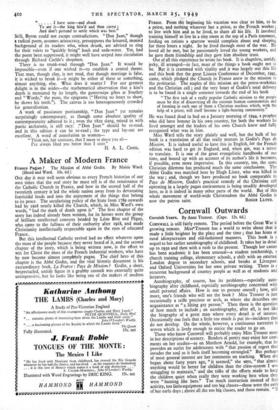A Maker of Modern France
France Pagan ? The Mission of Abbe Godin. By Maisie Ward. (Sheed and Ward. 10s. 6d.) ONE day it may well seem obvious to every French historian of our own times that the real story he must tell is of the renaissance of the Catholic Church in France, and how in the second half of the twentieth century it led the whole nation away from its devastating fratricidal feuds and into the enjoyment of the things that belong to its peace. The secularising policy of the State from 1789 onwards had by 1918 nearly killed the Church, which, in Miss Ward's own words, " had the mark of death upon it." The first chapter of the story has indeed already been written, for its heroes were the group of brilliant intellectual converts headed by ,Lion Bloy and Peguy, who came to the fullness of their authority after 1918, and made Christianity intellectually respectable again in the eyes of educated France.,
But this intellectual Catholic revival had no effect whatever upon the mass of the people because they never heard of it, and the second chapter of the story, which is being written now, is the effort to win for Christ the mass of the French industrial _workers, who have by now become almost completely pagan. The chief hero of this chapter is the Abbe Godin, and the vital historic document is his extraordinary book, La France : Pays de Mission ? Godin, a short, bespectacled, untidy figure in a grubby cassock was externally quite unimpressive, but he looks like being one of the makers of modern
WYWYV`refv"rtrrif• rv-rwrrivyv•r■rrry•rtrrrrrran•
Katharine Anthony
THE LAMBS (Charles and Mary)
A Study of Pre-Victorian England
An affectionate study of that courageous couple Charles and Mary Lamb."
PETER QUENNELL, Daily Mail " . . contains plenty of interesting facts about the Lambs and their circle."
John O'Lanclon's Weekly
" . . a fascinating picture of the Society in which the Lambs lived."
The Queen Fully illustrated. 15s. net
J. Frank Roble TONGUES OF THE MONTE :
The Mexico I Like
" He has lived with Mexicans from childhood, has crossed the Rio Grande whenever he has had the chance, and has lived. as the vaqueros do themselves . . . it is this love of Mexico which makes it a book of real distinction . . A. CALDER-MARSHALL, John O'London's Weekly.'
Illustrated with Wood Engravings by ERIC KING. 15s. net
HAMMOND HAMMOND
•
France. From tile beginning his vocation was clear to him, to be a priest, and nothing whatever but a priest, to the French worker ; to live with him and as he lived, to share all his life. It involved training himself to live in a tiny room at the top of a Paris tenement, feeding on rations a sparrow would complain about and sleeping for three hours a night. So he lived through most of the war. He loved all he met, but he passionately loved the young workers, and he gave them friendship and they gave him absolute trust. Out of all this experience he wrote his book. It is shapeless, untidy, jerky, ill arranged—in fact, most of the things a book ought not to be. But it is crammed with vitality and it was largely out this life and this book that the great Lisieux Conference of December, 1943, came, which pledged the Church in France anew to the mission to the proletariat. The staples of this mission are the priest-workman and the Christian cell ; and the very heart of Godin's total delivery is to be found in a single sentence towards the end of his book " The first task of a really popular Catholic mission to the people must be that of discovering all the existent human communities and of forming in each one of them a Christian nucleus which, with the help of a priest, will itself become a light-bearing community."
He was found dead in bed on a January morning of 1944, a prophet who did have honour in his own country, for both the workers 'he lived amongst and the leaders of his own Church knew and fully recognised what was in him.
Miss Ward tells the story plainly and well, but the bulk of her book is a translation of .all that really matters in Godin's Pays de Mission. It is indeed useful to have this in English, for the French edition was hard to get in England, and, when got, was a terror to translate. It is one of the great evangelistic handbooks of our time, and bound up with an account of its author's life it becomes, if possible, even more impressive. In this country, too, the same Christian dilemma has produced much the same conclusions. The Abbe Godin was matched here by Hugh Lister, who was killed in
the war ; and, though we have produced no book comparable to Pays de Mission, Godin's practical remedy of the Christian cell operating in a largely pagan environment is being steadily developed here, as it is indeed in many other parts of the world. But of this whole movement of world-wide Christendom the Abbe Godin is














































 Previous page
Previous page